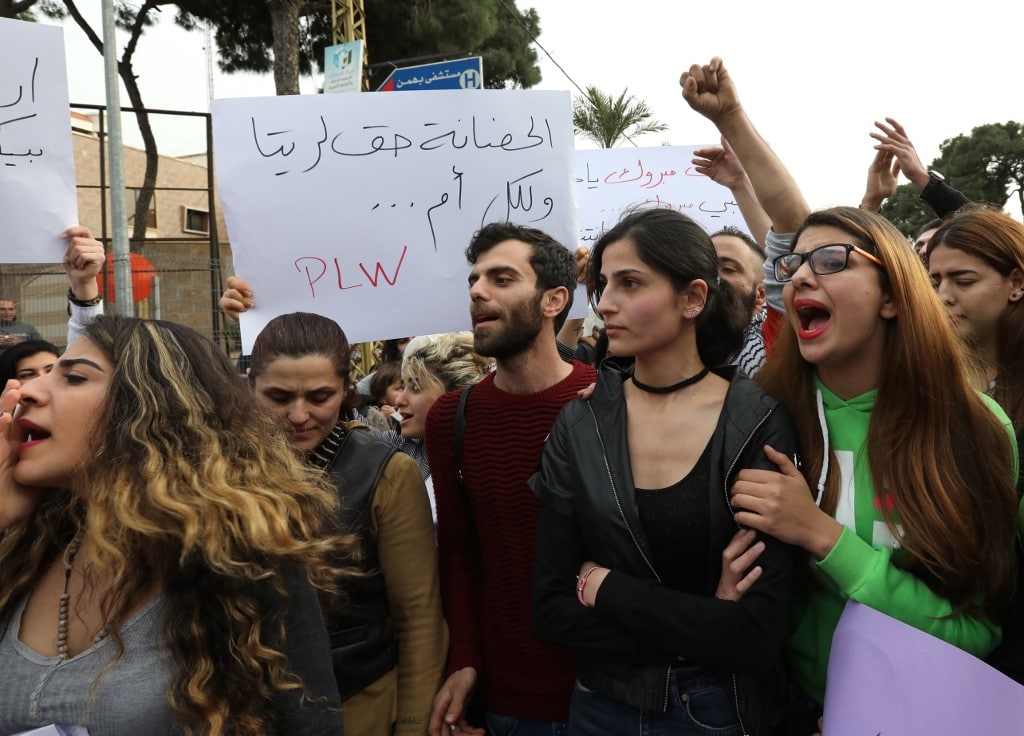As in many countries, women in Lebanon are discriminated against, facilitated by the existence of 15 religion-based personal status laws. One of these laws determines children’s custody in case of a divorce and prevents mothers from raising their children.
The accidental death of women’s rights activist Nadine Jouni on 6 October 2019 while she was on her way to a protest against tax increases amid a spiralling financial crisis once again put the question of mothers’ rights in the spotlight.
Aged 29, Jouni was part of the National Campaign to Raise the Age of Custody within the Shiite Community, having struggled against an abusive husband who prevented her from seeing her son Karam after their divorce. She worked with ABAAD, a gender equality organization, and was a facilitator and lobbyist for the extensive campaigns run by the organization advocating the rights of women and underage girls. She was also the architect of many virtual campaigns and street demonstrations against the rape of underage girls (‘Shame on Who’) and child marriage (‘Not before 18’). She founded the Protecting Lebanese Women organization (PLW) in order to help women as well as mothers in her country.
In 2015, a report by the international organization Human Rights Watch (HRW), called unequal and Unprotected, listed all the forms of discrimination facing women in Lebanon, including mothers. It said, for example, ‘Across all confessions, women faced legal and other obstacles when terminating unhappy or abusive marriages; limitations on their pecuniary rights; and the risk of losing their children if they remarry or when the so-called maternal custody period (determined by the child’s age) ends. Women were also systematically denied adequate spousal support during and after marriage – with religious courts often unfairly denying or reducing payments, including if a judge found a woman to be “recalcitrant” by leaving the marital home and refusing to cohabit with her husband or filing for severance. Children also face violations of their rights, most importantly the right to have their best interest considered in all judicial decisions concerning their welfare, including rulings regarding their primary care giver.’
In terms of custody, Shiite, Sunni and Druze religious laws generally maintain that, in the event of divorce, the child’s age, not their best interest, should determine with whom they reside. Sunni judges can, on an individual basis, consider the best interest of the child in determining custody, as can Christian judges.
Across religious laws, with the exception of the Armenian Orthodox personal status law, the right of guardianship both during marriage and after divorce is granted to the father who is recognized as the peremptory moral and financial guardian of his children. In a Shiite custody case, mothers can keep their daughters until they turn seven years old and their sons turns two, after which time they have to be raised by the father’s family.
Jouni was in a Shiite marriage and was separated from her son after a painful divorce, despite her former husband being abusive and violent in the home. Back in 2013, Jouni was interviewed by the Daily Star during a sit-in in the capital Beirut in front of the Higher Shiite Council to demand that it revise its custody laws to be fairer to women. The article said she was only allowed to see her son for 24 hours every ten days.
Zeina Ibrahim, a friend of Jouni’s who also worked for PLW, told Fanack that she had joined the organization after realizing that her former husband could have taken her child if he had wanted to, which upset her.
“He had no problem giving me my son, but it is not always like this for women,” she said. “I met with Nadine and joined PLW to make this issue known better in Lebanon. With PLW, we are gathering mothers suffering from this kind of law and asking for a new one. We want the religious courts to raise the age of custody with the mother from two to seven for the boys and from seven to nine for the girls, then have shared custody until the child’s majority. We found a fatwa [nonbinding legal opinion on a point of Islamic law] saying that, and many religious men are supporting us. We have been particularly active towards the Shiite Council, whose members told us at first it was impossible, then started to make some small changes. But it’s not enough.”
Among the changes that have been made are codifying the Coptic personal status law in 2012, amending Evangelical and Orthodox personal status laws and implementing Law 422 on the Protection of Children in Conflict With the Law or at Risk (2002).
But according to the HRW report, the only way to effectively address discrimination against mothers is to have a civil law on personal status, which seems impossible in the current climate of sectarian division.
The report said: ‘One solution is to adopt a civil code that would ensure equal rights for all Lebanese, regardless of gender or religion. Current efforts to adopt a civil code have focused on making it optional for people. In that sense, it would operate alongside religious laws. … Yet such a law alone will not be enough to end the discrimination in personal status that stems from existing religious personal status laws. Fundamental changes must also be made to existing religious legal codes, and state institutions must exercise oversight over religious courts and texts.”
Ibrahim also told Fanack she thinks a legal marriage contract with clauses and agreements before any wedding could also help, but that it would not be easily accepted in Lebanese society.
